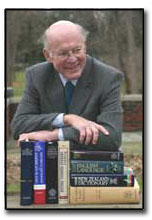May 2006
Talking about words with Richard W. Bailey:
Gimme Grammar
Do you think English doesn't have enough grammar? Or maybe it has too much.
Of course English has plenty of grammar, and certainly enough for getting our thoughts out and down. But does it have the right amount of it?
Some people discern in the language just a hint of grammar.
One German (in 1851) laid the foundation for the idea that English didn't have enough: Arthur Schopenhauer, a famously pessimistic philosopher. Schopenhauer had attend school in England and was fluent in our language, but he thought, in general, that things were getting worse and language getting worse in particular.
The "more perfect" the language, the more grammar it has, he wrote. English is a language lying in the ruins of an earlier, more grammatical paradise.
By this Schopenhauer meant it is a good thing to have a lot of suffixes (like slow, slower, and slowly) or vowel changes (like run and ran). Sanskrit, a language he especially admired, has not just singular and plural in the pronoun system (like I and we) but a dual (as in you-and-me-and-nobody-else). It has eight cases compared to our three. (Our cases are usually called in school subjective, objective and possessive.) In short, Sanskrit is rich in grammar—at least if grammar means things you do to words to make them fit together in sentences. In English, we just hitch the words together, one after another, with hardly a trace of the old endings.
Thinking that having more grammar would be a good thing, a few oddballs have wanted to reform English to make it more like Sanskrit. One of these, John Pinkerton, proposed in 1785, to not only give English more grammar but also to make it more melodious at the same time. Pinkerton didn't like words that end in hissing sounds, so he would get rid of all English plurals and put in their place –a, so we would speak of one paper and two papera. He wanted to make modifiers agree with their nouns and so recommended mya morninga devotiona for my morning devotions. More grammar; better English. And you could easily distinguish the morning that functions as an adjective from the one where it functions as a noun. In this phrase, we'd know right off that morninga had attached itself to a plural noun.
Pinkerton was a remarkable example of a figure of the Scottish Enlightenment who refused to be enlightened. He is introduced in Wikipedia with this remarkable sentence: "John Pinkerton (February, 1758—March 10, 1826) was a British antiquarian, author, forger, numismatist, pseudo-historian and early advocate of Germanic racial supremacy theory." No wonder that Pinkerton's grammatical ideas are not even mentioned when there is so much else of his contributions to history to attract attention.
Plenty of people have wanted more from English grammar. Pinkerton—known in life to his friends as Pinkie-Winkie—wanted to do something more to help it out. Bring on the grammar.
Some people think English doesn't have any grammar at all.
Here's President Harry Truman greeting the President of Ecuador in 1951. He started by explaining that President Galo Plaza had been born in New York and educated in America. In a genial introduction, President Truman said: "He tells me that he studied English because English has no grammar and you can say what you please and anybody can understand what you are saying. I agree with him on that."
President Plaza noted that Spanish is a "very grammatical language." Showing his command of English idiom, he said: "I have been allergic to grammar all my life, so English was right down my alley."
English is right down my alley and yours too, I'd bet. There's no point in thinking that giving it more grammar than it already has would make things any better. Or taking away the grammar it has would make things worse.
 Richard W. Bailey is the Fred Newton Scott Collegiate Professor of English. His most recent book is Rogue Scholar: The Sinister Life and Celebrated Death of Edward H. Rulloff, University of Michigan Press, 2003--a biography of an American thief, impostor, murderer and would-be philologist who lived from 1821 to 1871. It was published by the University of Michigan Press in 2003. Richard W. Bailey is the Fred Newton Scott Collegiate Professor of English. His most recent book is Rogue Scholar: The Sinister Life and Celebrated Death of Edward H. Rulloff, University of Michigan Press, 2003--a biography of an American thief, impostor, murderer and would-be philologist who lived from 1821 to 1871. It was published by the University of Michigan Press in 2003.
|

 Richard W. Bailey is the Fred Newton Scott Collegiate Professor of English. His most recent book is Rogue Scholar: The Sinister Life and Celebrated Death of Edward H. Rulloff, University of Michigan Press, 2003--a biography of an American thief, impostor, murderer and would-be philologist who lived from 1821 to 1871. It was published by the
Richard W. Bailey is the Fred Newton Scott Collegiate Professor of English. His most recent book is Rogue Scholar: The Sinister Life and Celebrated Death of Edward H. Rulloff, University of Michigan Press, 2003--a biography of an American thief, impostor, murderer and would-be philologist who lived from 1821 to 1871. It was published by the 